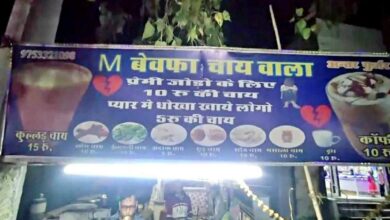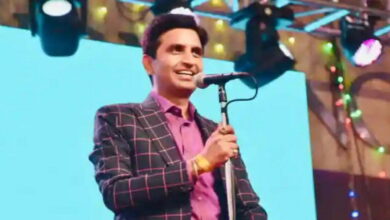Who has to walk on the path of duty?

The road leading from Rashtrapati Bhavan to India Gate, built on the hills of Raisina, has been renamed from Rajpath to Duty Path. Prime Minister Narendra Modi inaugurated it on the sidelines of the completion of the first phase of his government’s highly controversial Central Vista project. Rajpath was earlier named Kingsway i.e. King’s Way. Its name was changed after the independence of the country. Since the offices of the Government of India are located on both sides of this road, from where the work of the state is carried out, hence it was named Rajpath. Now its name has been changed to duty path. It is not possible to predict what will change with the name change. After all, what welfare has been done to the people by changing the name of Race Course Road to Lok Kalyan Marg? The Prime Minister’s residence is on that road, but when the work of PM Enclave under the Central Vista project is completed, the PM’s residence will be removed from Lok Kalyan Marg.
However, changing the name has been a pastime of this government. How many streets have been renamed in Lutyens’ Delhi. Race Course Road was renamed as Lok Kalyan Marg. Aurangzeb Road was renamed as APJ Abdul Kalam Road. The road adjacent to Rashtrapati Bhavan was renamed Dalhousie Road after Dara Shikoh, the brother of Aurangzeb. Now the name of Rajpath has become the duty path. All this has happened in the last five years. The names of cities, streets, roads, railway stations, etc. have been changed across the country outside Lutyens’ Delhi. But the matter of renaming Rajpath is very different from other changes. This is not a road named after a Mughal ruler or an Englishman, or the spirit of racing horses. It is a road symbolizing the monarchy. Yet if it is combined with duty, then its purpose is something else.
Keep in mind that whenever the governments are not successful in fulfilling their responsibility, they ask the public what they have done for the country. Even these days, people are repeatedly advised in social media not to ask what the country has done for them, but to think about what they have done for the country. It seems to be a clever attempt to absolve the government of its responsibilities. Through this, people are explained that the country is very vast, its population is very high and nothing has happened in the last 70 years, so the government will take time to fix everything. Till then people wait. Meanwhile, they should perform their duties and contribute to the development of the country. If the government is not able to give them employment or is collecting money from them by levying more tax, then they should keep silent considering it as a work of national interest. They are basically doing their duty by paying more taxes.
Prime Minister Narendra Modi in his speech from the Red Fort this year referred to the ‘Paan Prana’. He said that this would make the country a developed country in the next 25 years. His fifth life is that of duty. He appealed to the people of the country to perform their duties. When you know the history of the articles related to duties in the Constitution, you will automatically understand what the appeal of Prime Minister Modi means. Civil duties were not mentioned in the original constitution. The Constitution which was prepared by the Constituent Assembly after a long debate and which was adopted by the country, did not contain the Article of Duties. In it there were articles related to rights and Directive Principles of State Policy. Article 12 to 35 of the Constitution deals with Fundamental Rights. At that time the Constituent Assembly did not consider the need to fix the duties of the citizens. The Article of Duties was added in 1976 at the time when the Emergency was imposed in the country. During the Emergency, Indira Gandhi’s government added Fundamental Duties through the 42nd Amendment of the Constitution on the recommendations of the Swaran Singh Committee. It has been placed in Part IV-A of the Constitution. Earlier 10 duties of citizens were mentioned but in 2002 Atal Bihari Vajpayee’s government added one more duty to it.
The Prime Minister or the government has not explained the philosophical thinking behind renaming Rajpath as the path of duty. Maybe people should be told that through the path of duty, a message has been given to the people running the government that they should be aware of their duties. This twist may come. But in reality it has a different purpose. For the past many years, people are being explained that they should discharge their duties. More emphasis is being laid on duties than on their rights. For example, the responsibility of cleanliness was placed on the citizens without creating the basic system of keeping the cities, towns and villages clean. But citizens can be expected to discharge their duties due only when all their fundamental rights are ensured. It is a different matter that citizens themselves perform most of the duties and if they do not, then there is a law to get them performed.
There are civil duties in India, which can lead to jail if not followed. Like respecting the national symbols is the first duty. If citizens do not do this, then there is a law to send them to jail. Similarly a duty is to maintain the unity, integrity and sovereignty of the country. Failure to comply with this is also a law to send to jail. It is also a fundamental duty to protect the environment and there is a provision of going to jail for not fulfilling it. It is also a fundamental duty to protect government property and failure to do so can lead to imprisonment. It is also a duty to maintain mutual harmony and there is a law to send it to jail for its violation. The Vajpayee government added a duty in 2002 that every parent has a duty to send their child between the ages of six and 14 to school. But in the country, close to 1.5 crore children under the age of 14 work instead of going to school. This is a punishable offence.
Think, there are laws to send to jail for not discharging the duties. But if the rights are not given, the citizen cannot do anything. The responsibility of the governments for that cannot be fixed. The constitution gives citizens the right to live with dignity. But crores of people are leading a bad life like animals. But no government is responsible for this. The Constitution talks about equality before the law and gives freedom of speech and expression to all. But there is a system of equal law for the equals in the country and there is a guard in place if there is no restriction on speaking. People are dying of hunger, people are not destined to have clean drinking water, somewhere people are dying by drowning in floods, somewhere they are dying due to rain and thunder, somewhere people die due to heat and cold, then oxygen in epidemics, die of lack of medicine and treatment. Good and cheap education and health facilities are not available to everyone. But no one is held responsible for this. Needless to say, in which direction will the country take the country by taking away the rights or depriving them of the citizens in the discharge of their duties.




